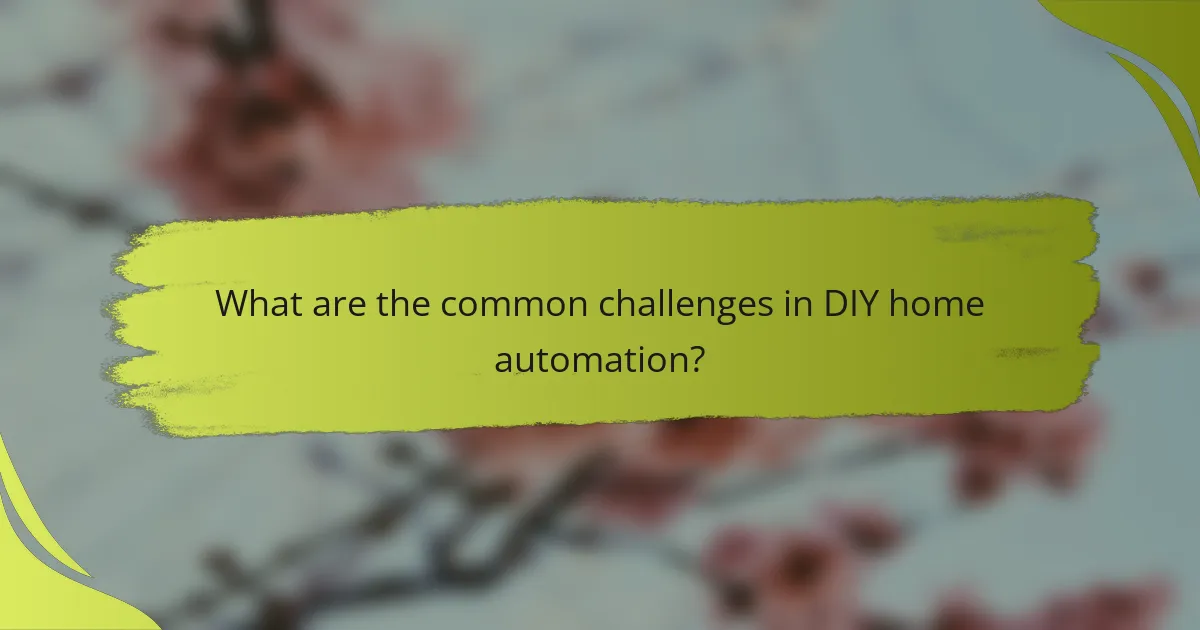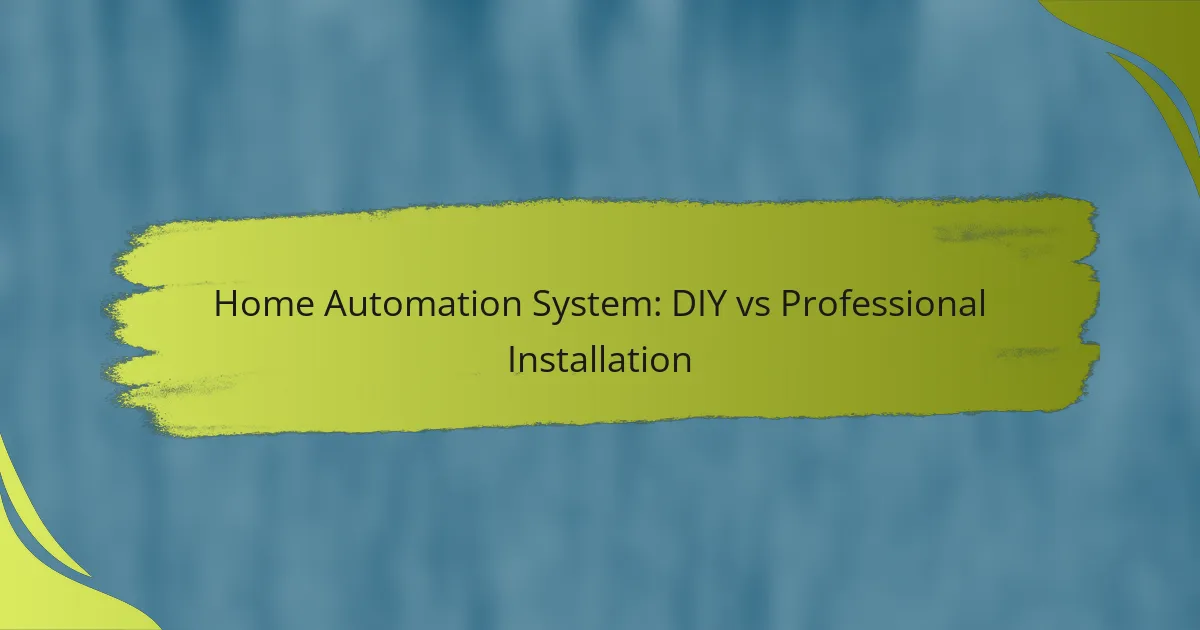When considering a home automation system, the choice between DIY installation and professional services is crucial. DIY options provide cost savings and customization, allowing homeowners to create a setup tailored to their preferences. In contrast, professional installation brings expertise, efficiency, and ongoing support, ensuring a reliable and effective system. Evaluating your budget, the system’s complexity, and your maintenance readiness will guide you in making the best decision for your smart home journey.

What are the benefits of DIY home automation systems?
DIY home automation systems offer several advantages, including cost efficiency and the ability to tailor setups to individual preferences. By taking on the installation yourself, you can create a personalized smart home experience that aligns with your specific needs.
Cost savings
One of the primary benefits of DIY home automation is the potential for significant cost savings. Professional installation can add hundreds to thousands of dollars to your project, while DIY options often allow you to purchase equipment directly, avoiding labor costs.
For example, a basic smart lighting system might cost around $100 for DIY installation, whereas hiring a professional could push that cost to $300 or more. By researching and selecting products wisely, you can maximize your budget and achieve a functional system without overspending.
Customization options
DIY home automation systems provide extensive customization options, enabling you to select devices and configurations that best suit your lifestyle. You can mix and match products from various brands, ensuring compatibility with your existing devices and personal preferences.
For instance, you might choose smart bulbs, sensors, and a hub that work seamlessly together, creating a cohesive system tailored to your daily routines. This level of personalization is often limited with professional installations, which may push specific brands or packages.
Learning experience
Installing a DIY home automation system can be a valuable learning experience. As you engage with the technology, you gain insights into how different devices interact and how to troubleshoot common issues.
This knowledge can empower you to make future upgrades or modifications independently, saving time and money down the line. Additionally, understanding your system better can enhance your ability to optimize it for energy efficiency and security, leading to a smarter home overall.

What are the advantages of professional installation?
Professional installation of home automation systems offers several key benefits, including expert knowledge, time savings, and ongoing support. These advantages can significantly enhance the effectiveness and reliability of your home automation setup.
Expertise and experience
Professionals bring specialized knowledge and years of experience to the installation process. They are familiar with various systems, ensuring compatibility and optimal performance. This expertise helps avoid common pitfalls that DIY installers might encounter, such as improper wiring or configuration issues.
Additionally, professionals stay updated on the latest technologies and industry standards, which can lead to a more efficient and future-proof installation. Their insights can help you select the best devices and solutions tailored to your specific needs.
Time efficiency
Hiring a professional can save you considerable time during the installation process. While a DIY project might take several hours or even days, a trained technician can often complete the job in a fraction of that time. This efficiency allows you to enjoy your home automation system sooner.
Moreover, professionals can quickly troubleshoot any issues that arise during installation, minimizing downtime. This is particularly beneficial for complex systems that require precise setup and calibration.
Comprehensive support
Professional installation typically includes ongoing support and maintenance options. This means that if you encounter any issues after installation, you have access to expert assistance. Many companies offer warranties or service plans that cover repairs and upgrades, providing peace of mind.
Additionally, professionals can guide you on how to use your system effectively, ensuring you maximize its capabilities. This support can be invaluable, especially for users who are not tech-savvy or are new to home automation.

How to choose between DIY and professional installation?
Choosing between DIY and professional installation for a home automation system depends on your budget, the complexity of the system, and your willingness to manage long-term maintenance. Assessing these factors will help you make an informed decision that suits your needs and capabilities.
Budget considerations
Budget is a crucial factor when deciding between DIY and professional installation. DIY installations can save you money on labor costs, but you should account for the price of equipment and tools. Professional installation typically ranges from a few hundred to several thousand dollars, depending on the system’s complexity and the technician’s expertise.
When budgeting for a DIY project, consider potential hidden costs such as additional equipment, software subscriptions, or troubleshooting services. It’s wise to set aside a contingency fund of about 10-20% of your total budget to cover unexpected expenses.
Complexity of the system
The complexity of the home automation system significantly influences your choice between DIY and professional installation. Simple systems, like smart lighting or basic security cameras, are often manageable for most homeowners. However, more intricate setups involving multiple integrated devices, home networks, or advanced security features may require professional expertise.
Before starting a DIY project, evaluate your technical skills and comfort level with technology. If the system requires extensive wiring, programming, or troubleshooting, hiring a professional may save you time and frustration.
Long-term maintenance
Long-term maintenance is another important consideration when choosing between DIY and professional installation. DIY systems may require you to handle updates, repairs, and troubleshooting, which can be time-consuming and complex. If you’re comfortable with technology and willing to invest time, a DIY approach can be rewarding.
On the other hand, professional installations often come with warranties and ongoing support, which can alleviate maintenance concerns. If you prefer peace of mind and less hands-on involvement, investing in professional services may be the better option for your home automation system.

What are the best DIY home automation products available in India?
Some of the best DIY home automation products in India include smart hubs, lighting solutions, and smart plugs that enhance convenience and energy efficiency. These products are user-friendly, allowing homeowners to set up and manage their systems without professional help.
Google Nest Hub
The Google Nest Hub serves as a central control unit for various smart devices, allowing users to manage their home automation through voice commands or a touchscreen interface. It integrates seamlessly with Google Assistant, enabling voice-activated control of compatible devices.
Consider the Nest Hub’s ability to display information visually, such as weather updates, calendar events, and security camera feeds. Its compact design makes it suitable for any room, and it can also function as a digital photo frame when not in use.
Philips Hue Smart Lights
Philips Hue Smart Lights offer a versatile lighting solution that can be controlled remotely via a smartphone app or voice commands. Users can choose from a wide range of colors and brightness levels, allowing for personalized ambiance in any space.
Installation is straightforward, as the lights connect to a bridge that links them to your Wi-Fi network. Be mindful of the initial investment, as the bridge and bulbs can be pricier than traditional lighting, but the energy savings and customization options often justify the cost.
TP-Link Kasa Smart Plugs
TP-Link Kasa Smart Plugs allow users to control any device plugged into them remotely, making it easy to automate appliances like lamps, fans, or coffee makers. They are compatible with both Alexa and Google Assistant for voice control.
Setting up the Kasa Smart Plugs is simple; just plug them in, connect to your Wi-Fi, and use the Kasa app to manage your devices. A key benefit is the scheduling feature, which can help reduce energy consumption by turning devices on or off at specific times.

What are the top professional home automation services in India?
In India, leading professional home automation services include companies like Lutron, Control4, and Crestron, which offer comprehensive solutions tailored to various needs. These services provide expert installation, integration, and support for smart home technologies, ensuring seamless operation and enhanced convenience.
Home Automation India
Home automation in India is rapidly evolving, with a growing number of companies providing innovative solutions. These services typically encompass smart lighting, security systems, climate control, and entertainment systems, all controllable via smartphones or voice commands. Many providers offer customizable packages to suit different budgets and preferences.
When considering home automation in India, it’s essential to evaluate the compatibility of devices and the scalability of the system. Look for solutions that can easily integrate with existing technologies and allow for future upgrades.
Smart Home Solutions
Smart home solutions in India focus on enhancing convenience, security, and energy efficiency. These systems often include smart thermostats, automated blinds, and advanced security cameras. Users can monitor and control their homes remotely, providing peace of mind and energy savings.
Choosing the right smart home solution involves assessing your specific needs and the types of devices you wish to integrate. Consider factors such as ease of use, customer support, and the range of compatible products when making your decision.
Control4
Control4 is a prominent player in the home automation market, known for its user-friendly interface and extensive device compatibility. This system allows homeowners to control lighting, audio, video, and security from a single platform, making it a popular choice for those seeking a comprehensive solution.
When opting for Control4, it’s advisable to consult with certified installers who can tailor the system to your home’s layout and your lifestyle. This ensures optimal performance and a seamless integration of all smart devices.

What are the common challenges in DIY home automation?
DIY home automation can be rewarding but comes with several challenges. Users often face issues related to technical knowledge, compatibility of devices, and troubleshooting, which can complicate the installation process.
Technical knowledge requirements
Installing a home automation system requires a solid understanding of technology and networking. Users need to be familiar with concepts like Wi-Fi configurations, device compatibility, and programming interfaces to ensure all components work together seamlessly.
For those without a technical background, the learning curve can be steep. Basic knowledge of electrical systems and an understanding of how smart devices communicate can significantly ease the installation process. Consider online tutorials or forums for guidance.
Common pitfalls include misconfigured devices and network issues, which can lead to frustrating experiences. It’s advisable to start with a simple setup, gradually adding more devices as you gain confidence and expertise. This incremental approach can help avoid overwhelming challenges.
